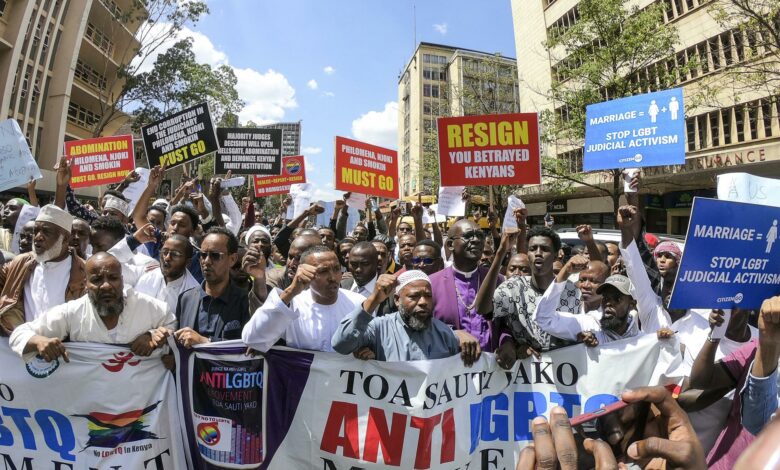Hundreds oppose LGBTQ people during slanderous Kenyan protest
Colin Stewart is a 45-year journalism veteran living in Southern…
Anti-LGBT protestors spread lies to demonize queer Kenyans

Human rights organizations have condemned an anti-LGBTQ protest attended by hundreds who chanted hateful and misleading slogans in Nairobi, Kenya, last week. Erasing 76 Crimes presents this account from the EFE News Agency below, along with resources to help fight back against anti-LGBTQ slander.
Hundreds of people took to the streets in Nairobi on Oct 6 to protest against the LGBTQ community in a demonstration that has been condemned by human rights organizations.
The demonstrators gathered in front of the Supreme Court in downtown Nairobi to reject the decision made by the court last February, when it allowed the legal registration of a pro-LGBTQ rights organization in the country against an appeal by the Kenyan government.
Three judges voted in favor of the ruling, while two dissented, arguing that Kenya cannot allow the registration of an organization that advocates actions contrary to or expressly prohibited by the Penal Code.
At the rally, National Assembly member Mohamed Ali read a speech criticizing the “misleading ruling of the Supreme Court.”
“In Kenya, as in other African countries, most customs, cultures and religious traditions consider homosexuality to be wrong, unnatural and ungodly,” Ali said.
The demonstrators, who were convened by Muslim and Christian associations, among others, carried banners with slogans such as “Kenya is not Sodom and Gomorrah,” “LGBTQ is not African,” and “Demons inspired LGBTQ.”
[Erasing 76 Crimes editors’ note: All of those slogans are false or misleading. See the following 76crimes articles:
- 21 varieties of traditional African homosexuality
- Homosexuality has always been African, but the term LGBT is new and divisive
- Correcting the old wrong ideas about Sodom and Gomorrah]
Rights organizations have condemned the protest. In a statement, the Kenya Human Rights Commission called the protest “dangerous” and denounced the “hate campaign” that such protests represent.
In a separate release, Amnesty International said it was “deeply concerned about the recent surge in anti-LGBTIQ+ (Lesbian, Gay, Bisexual, Transgender, and Intersex and Queer persons) online and offline statements and actions” in Kenya.
“It is our earnest appeal to political and religious leaders in Kenya to exercise care and caution in their public statements regarding the LGBTIQ+ communities. Instead of promoting hostility, discrimination and violence against other Kenyans, we urge them to engage in respectful dialogue with community representatives,” said Amnesty International Kenya Executive Director Irungu Houghton.
Following the Supreme Court ruling, Kenyan President William Ruto said he would not allow same-sex marriage because such a union is against his country’s culture and tradition.
“I am a God-fearing man. Although we respect the court, our religion, traditions, laws and customs do not allow women to marry women or men to marry men,” Ruto said at an event in Nairobi last March.
While Kenya’s constitution only provides for marriage between members of the opposite sex, the penal code punishes sex “against the order of nature” with up to fourteen years in prison.
Of the 66 countries in the world that criminalize same-sex relations, 31 are in Africa, where most of these laws are a legacy of the colonial era.




